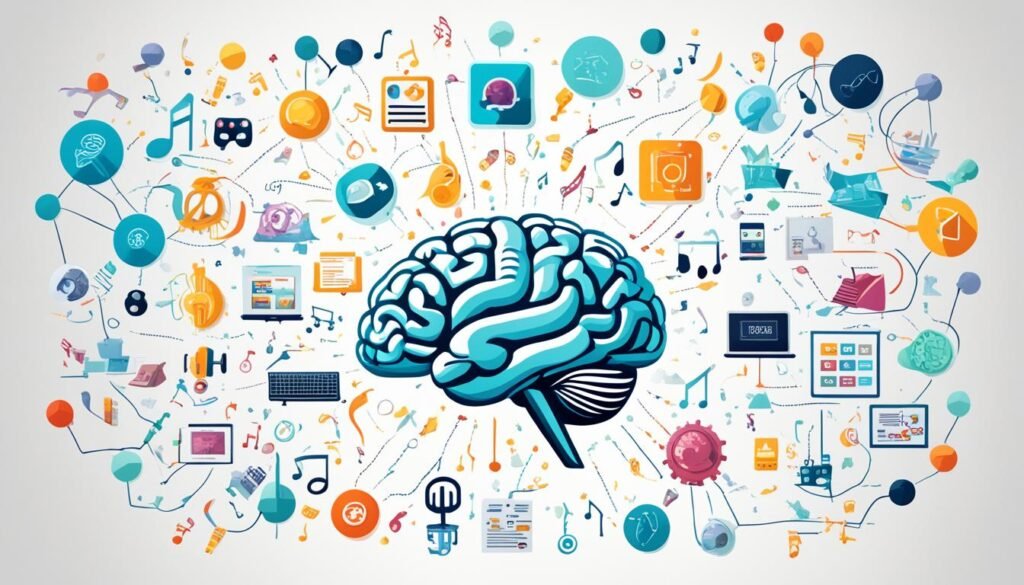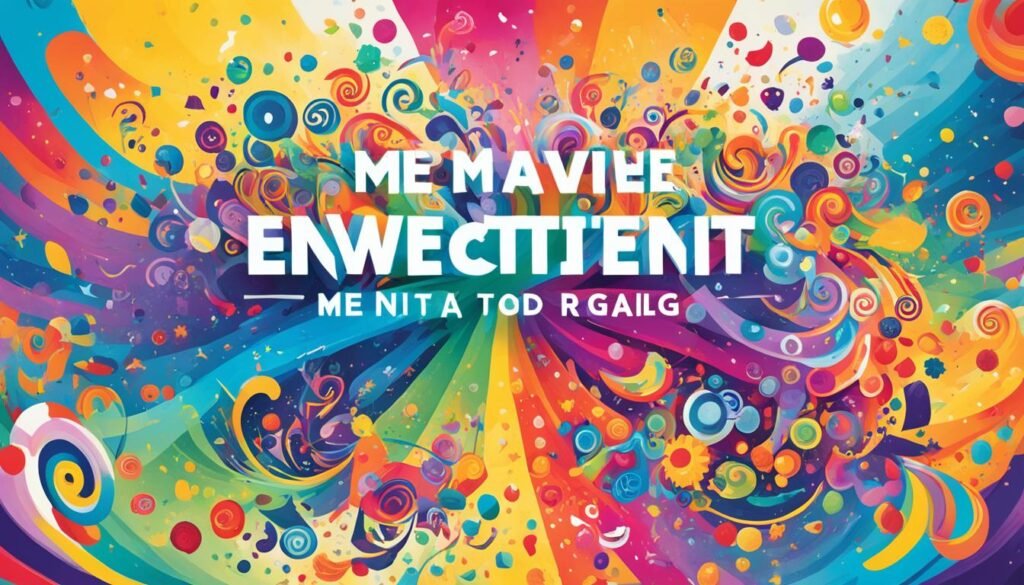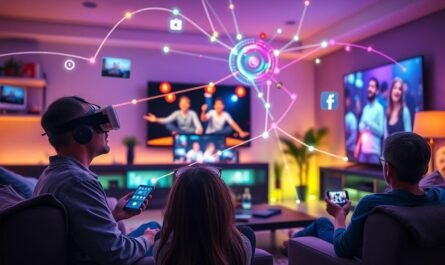Entertainment plays a vital role in promoting mental health and well-being. It serves as a stress-reliever and provides an escape from daily routines. Engaging with entertainment can offer relaxation and unwind. It also fosters a sense of connection with others, whether shared experiences with friends or solitary enjoyment of common interests. Furthermore, entertainment inspires and challenges us to think critically, exposing us to new ideas and perspectives.
Key Takeaways: Entertainment Important for Mental Health
- Entertainment offers stress relief and acts as an escape from daily routines.
- Engaging with entertainment fosters a sense of connection and shared experiences.
- Entertainment inspires and challenges us to think critically.
- It exposes us to new ideas and perspectives.
- By unwinding and enjoying entertainment, we can prioritize and improve our mental health.
The Benefits of Entertainment for Mental Health
Entertainment provides numerous benefits for mental health, promoting feelings of positivity, well-being, and stress relief. Engaging in entertaining activities releases endorphins, the «feel-good» chemicals in the brain, reducing stress hormones like cortisol. This temporary respite from daily challenges allows individuals to recharge and rejuvenate, ultimately improving their mental well-being.
Also Read : Las 10 Mejores Películas De Terror
Social connection is another significant advantage of entertainment for mental health. It fosters relationships and creates a sense of community, both in-person and online. Whether attending live performances, participating in group activities, or connecting through shared interests on social media platforms, entertainment offers opportunities to connect with others and establish meaningful connections.
Also Read : Las 15 mejores canciones de Fanny en España
Stress relief is a crucial aspect of mental health, and entertainment serves as an effective strategy for relaxation. Engaging in entertaining activities provides a welcome distraction from daily stressors, allowing individuals to escape their worries and immerse themselves in enjoyable experiences. This break from stress not only helps individuals unwind but also replenishes their mental energy and resilience.
Also Read : Las 15 Mejores Películas De Éxito En España
Entertainment has the power to transport us to different worlds, evoke a range of emotions, and enable us to momentarily forget our troubles. It provides a much-needed escape and gives us the chance to focus on something other than our own worries.
Also Read : ¿quiénes Son Las 10 Estrellas En Ascenso En La Escena Del Entretenimiento?
The benefits of entertainment extend beyond immediate enjoyment. It also offers cognitive stimulation and growth. Engaging in activities that challenge the mind, such as playing video games, solving puzzles, or reading, can improve cognitive functioning and problem-solving skills. Additionally, entertainment provides opportunities for learning and expanding knowledge, whether through educational TV shows, documentaries, or thought-provoking films.
Also Read : ¿quién Decide Los Rankings De Entretenimiento?
Stress Relief and Social Connection Through Entertainment
One of the primary reasons entertainment is beneficial for mental health is its ability to alleviate stress and promote social connection. Engaging in entertaining activities offers a much-needed respite from daily challenges, reducing stress levels and improving overall well-being.
| Benefits of Entertainment for Mental Health | Examples |
|---|---|
| Reduces stress and anxiety | Watching a comedy show or engaging in a hobby |
| Promotes positive emotions | Attending a live concert or dancing |
| Fosters social connection | Joining a book club or participating in a virtual gaming community |
Entertainment plays a vital role in maintaining and improving mental health by offering a range of benefits, from stress relief and social connection to cognitive stimulation and personal growth. By recognizing and embracing the positive impact of entertainment in our lives, we can prioritize our mental well-being and lead healthier and more fulfilling lives.
Cognitive Benefits of Entertainment

Entertainment not only provides enjoyment but also offers several cognitive benefits. Engaging with different forms of entertainment can enhance cognitive functioning, problem-solving skills, and intellectual growth.
Video Games: Enhancing Problem-Solving Skills
Playing video games is a popular form of entertainment that has been found to improve cognitive functioning. **Video games** require players to strategize, analyze situations, and make quick decisions, which enhances problem-solving skills and critical thinking. Additionally, video games often involve complex puzzles and challenges that stimulate the brain and improve logical reasoning. The hand-eye coordination required in many video games also contributes to cognitive development.
Educational TV Shows and Documentaries: Expanding Knowledge
Watching educational TV shows and documentaries is another way to benefit from entertainment while expanding knowledge and understanding of the world. These programs provide informative and thought-provoking content that stimulates curiosity and critical thinking. By exploring various subjects and real-life scenarios, educational entertainment encourages **cognitive engagement** and fosters intellectual growth.
Stimulating Critical Thinking
Engaging with entertainment that challenges existing perspectives and ideas can also stimulate critical thinking. Whether it’s through thought-provoking movies, books, or immersive video games, this form of entertainment encourages individuals to analyze, question, and evaluate different scenarios and viewpoints. By exercising critical thinking skills, individuals can enhance their cognitive abilities and develop a more adaptable mindset.
Overall, entertainment provides more than just a pleasant pastime. Its cognitive benefits extend to problem-solving skills, intellectual growth, and critical thinking. By engaging with a variety of entertainment options, individuals can stimulate their minds, boost cognitive functioning, and enjoy the mental benefits **associated with it**.
Entertainment as a Form of Escapism

In today’s fast-paced and demanding world, it’s essential to find moments of relaxation and escape. That’s where entertainment comes in. Whether it’s through books, movies, TV shows, or video games, entertainment provides a much-needed break from the everyday stresses and challenges we face.
Engaging in fictitious shows or stories allows our minds to wander and immerse ourselves in a different reality. It’s a chance to disconnect from our worries and responsibilities, giving us the opportunity to unwind and recharge.
Imagine sitting down to watch your favorite fantasy series or reading a gripping novel that takes you to far-off lands. These experiences transport us to a world where the problems and pressures of our daily lives fade away. We get lost in the captivating narratives, the intriguing characters, and the vivid settings.
Entertainment offers a diverse range of genres and experiences, allowing individuals to explore different identities and perspectives. It’s not just about escaping from reality; it’s about stepping into a different reality altogether. Whether it’s embarking on epic adventures, solving intricate mysteries, or delving into the depths of human emotion, entertainment offers a doorway to new and exciting experiences.
Moreover, entertainment provides a distraction from real-life challenges, giving our minds a break from the constant worries and anxieties we may face. It’s a chance to temporarily set aside our problems and focus on something enjoyable and entertaining.
Through entertainment, we can find solace, inspiration, and relaxation. It’s an opportunity to forget our own troubles and experience the joy, thrill, or laughter that comes with engaging in our favorite forms of entertainment. It’s a moment to recharge our batteries and regain a sense of balance in the midst of our busy lives.
In summary, entertainment serves as a form of escapism, allowing us to relax, explore different realities, and take a break from the pressures of everyday life. It’s a chance to immerse ourselves in captivating stories, characters, and experiences that transport us to a different world altogether.
Social Connection Through Entertainment

During times of social distancing or isolation, entertainment serves as a substitute for social connection, offering a virtual sense of community and fostering a feeling of belonging. Engaging in various forms of entertainment can bridge the gap between individuals, providing a platform for connection and interaction.
TV Shows and Online Communities
Watching TV shows has become a popular way to connect with others and share common interests. Whether it’s discussing the latest episodes, analyzing plot twists, or speculating about character development, TV shows create a shared experience that brings people together. Online communities dedicated to specific shows allow fans to connect with like-minded individuals, engaging in conversations and building relationships based on their shared love for the series.
«Engaging in various forms of entertainment can bridge the gap between individuals, providing a platform for connection and interaction.»
For example, online forums or social media groups centered around a particular show provide a space where fans can engage in discussions, share fan theories, and bond over their favorite characters. These platforms not only facilitate social connection but also offer a sense of belonging to a larger community of fans.
Music and Radio Broadcasts
Music has long been recognized as a universal language that brings people together. Listening to music can evoke emotions and create a shared experience, connecting individuals through a common appreciation for certain genres or artists. Whether attending concerts, music festivals, or simply listening to playlists online, music allows people to connect on an emotional level.
Radio broadcasts also play a role in fostering social connection. Listening to radio shows or podcasts provides an opportunity for individuals to engage with hosts and other listeners, participating in discussions and call-ins. It creates a sense of community and shared experience, even if individuals are physically apart.
Building Virtual Communities
Engaging with entertainment not only allows for virtual social connection but also enables the creation of virtual communities. These communities bring together individuals with shared interests and hobbies, providing a platform for interaction and support.
For example, online gaming communities allow players from different parts of the world to come together, collaborate, and compete in virtual worlds. These communities facilitate social connection and foster a sense of belonging within a specific gaming culture.
Furthermore, social media platforms provide spaces where individuals can connect with others who share similar interests, passions, or causes. Groups and pages dedicated to specific topics allow people to interact, share experiences, and find a sense of community in the online world.
| Benefits of Social Connection Through Entertainment |
|---|
| 1. Enhanced sense of belonging |
| 2. Opportunities for shared experiences |
| 3. Platform for engaging in discussions and interactions |
| 4. Access to a diverse range of perspectives and opinions |
| 5. Creation of virtual communities and support networks |
Emotional Benefits of Entertainment

Entertainment serves as a powerful tool for enhancing emotional well-being. Engaging in various forms of entertainment, such as movies and TV shows, allows individuals to explore complex emotions and social situations. By immersing themselves in compelling stories and characters, they can develop empathy and emotional intelligence, gaining a deeper understanding of the human experience.
Watching movies or TV shows that depict a range of emotions and perspectives can be a transformative experience. It enables individuals to connect with characters and their struggles, fostering a greater sense of empathy. This ability to empathize with others not only enriches personal relationships but also promotes a more compassionate and understanding society.
«Entertainment has the power to ignite inspiration and motivate individuals to overcome challenges and pursue their goals.»
Additionally, entertainment serves as a source of inspiration and motivation. Through captivating stories and compelling characters, entertainment provides examples of resilience, determination, and triumph in the face of adversity. It showcases individuals who overcome obstacles and achieve their dreams, inspiring viewers to do the same in their own lives.
Whether it’s a heartwarming sports movie that motivates individuals to push beyond their limits or a thought-provoking documentary that sparks a desire for positive change, entertainment has the power to ignite inspiration and motivate individuals to overcome challenges and pursue their goals.
Examples of Emotional Benefits in Entertainment:
- Character-driven stories that elicit empathy and emotional connection.
- Motivational films that inspire individuals to pursue their dreams.
- Thought-provoking documentaries that encourage a deeper understanding of social issues.
- Inspirational songs that uplift spirits and evoke positive emotions.
Entertainment as a Source of Advice and Help

Entertainment, such as TV shows and movies, not only entertains but also serves as a valuable source of advice and support when addressing societal issues. These programs tackle a wide range of serious and topical subjects, offering guidance and suggestions for appropriate handling. By delving into these issues, viewers have the opportunity to explore and gain insight, fostering understanding and facilitating conversations about various social and personal challenges.
Television shows are increasingly taking on important societal topics, providing a platform to discuss and address real-life issues. They offer advice through the development of relatable characters, whose journeys can inspire change and personal growth. Whether it’s exploring mental health, addressing discrimination, or navigating relationships, these portrayals open avenues for discussions and provide viewers with different perspectives and coping strategies.
“Television is an influential medium that has the power to shape our perceptions and opinions. By addressing societal issues, it has the ability to educate and bring about positive change.”
Movies, on the other hand, often highlight the human experience and shed light on challenges faced by individuals and communities. They can be a catalyst for social change by immersing the audience in powerful and thought-provoking stories that ignite conversations and motivate action. Whether it’s depicting historical events, shedding light on marginalized communities, or promoting inclusivity, movies offer guidance and inspire viewers to address societal issues.
Addressing societal issues through entertainment not only provides advice but also fosters a sense of community. It allows individuals to connect with others who may share similar experiences or challenges. By seeing their own struggles portrayed on screen, viewers can gain a sense of validation and support, knowing that they are not alone in their experiences.
The Power of Representation
One of the crucial ways in which entertainment offers advice and help is through the power of representation. By showcasing diverse characters and perspectives, it promotes inclusivity and encourages empathy. Seeing oneself reflected in the media can be empowering and affirming, providing guidance on how to navigate societal issues and challenges.
Moreover, when entertainment addresses societal issues, it helps break down barriers and promotes dialogue. It invites viewers to examine their own beliefs and biases, challenging them to think critically and consider alternative viewpoints. This exposure to different perspectives fosters understanding, empathy, and ultimately, positive change.
| TV Shows | Movies |
|---|---|
| Address a wide range of social issues | Shed light on important historical events |
| Provide guidance and advice through relatable characters | Promote inclusivity and representation |
| Catalyze conversations and change | Ignite empathy and understanding |
Entertainment, with its ability to captivate and engage audiences, can be a powerful tool for addressing societal issues and providing advice. By exploring challenging topics through relatable characters and thought-provoking stories, it promotes understanding, empathy, and positive change. So, the next time you watch your favorite show or movie, remember that you are not just being entertained—you are also gaining valuable advice and support while contributing to a more informed and compassionate society.
Entertainment as a Source of Hope

In times of uncertainty and adversity, entertainment can serve as a powerful source of hope. Whether it’s a captivating movie, a gripping series, or an inspiring performance, engaging with uplifting entertainment experiences can bring a renewed sense of optimism and a belief in a brighter future.
Watching live performances, such as theater shows or concerts, has the potential to truly uplift our spirits. The energy and talents of artists can resonate deeply, filling us with joy and reminding us of the beauty and creativity in the world. These experiences create a sense of togetherness, as we share the collective emotions and excitement with fellow audience members.
Similarly, uplifting shows on television or streaming platforms have a remarkable impact on our well-being. These shows have the ability to transport us to different worlds, where stories of resilience, triumph, and personal growth unfold. They inspire us to face our own challenges with determination and courage, fostering a sense of hope and possibility.
Engaging with entertainment that uplifts and inspires also provides a sense of reassurance and comfort. It reminds us that even in the face of adversity, there is always potential for positive change and transformative experiences. These stories and performances serve as a reminder that we are not alone in our struggles, and that hope can be found in the most unexpected places.
So during difficult times, when it may feel like hope is in short supply, turn to the power of entertainment. Allow yourself to be captivated by stories that ignite your imagination and touch your heart. Find solace in the melodies that uplift your spirit and make you believe in a brighter future. By embracing entertainment as a source of hope, you can nourish your soul and find the strength to face whatever challenges lie ahead.
The Importance of Entertainment in Our Daily Lives

Recognizing the significance of entertainment in our daily lives is crucial. It has numerous benefits for mental health and overall well-being, from stress relief and cognitive enhancement to social connection and emotional growth. Engaging with entertainment serves as a form of self-care, promoting a positive mindset and contributing to a healthier mental state.
“Entertainment is a powerful tool for improving mental health and well-being. It provides an avenue for individuals to relax, unwind, and escape the stresses of everyday life. Whether it’s watching a favorite TV show, reading a book, or listening to music, entertainment offers a much-needed break and a chance to recharge.»
Embracing entertainment as an essential part of our lives can positively impact our mental health. The enjoyment and pleasure derived from entertainment activities release endorphins, also known as «feel-good» chemicals, in the brain. This natural mood booster enhances overall well-being and promotes a sense of joy and contentment. Moreover, engaging in entertainment can improve cognitive function, stimulate creativity, and foster critical thinking skills.
Promoting Social Connection and Emotional Well-being
One of the significant advantages of entertainment is its ability to foster social connection. Whether it’s discussing a favorite TV series with friends or participating in online fan communities, entertainment provides opportunities for shared experiences and meaningful interactions. These connections can enhance a sense of belonging and create lasting friendships. Furthermore, engaging with emotionally resonant stories and characters through entertainment helps individuals develop emotional intelligence and empathy.
Escape and Relaxation
Entertainment offers a much-needed escape from the pressures and responsibilities of everyday life. It allows individuals to enter a different reality, providing a temporary respite from stress and anxiety. Whether it’s through enjoying a captivating movie, playing video games, or attending a live performance, entertainment offers relaxation and rejuvenation for the mind and body.
Fostering Inspiration and Motivation
Engagement with entertainment can also serve as a source of inspiration and motivation. When individuals see characters overcoming challenges, pursuing their dreams, and achieving success, it instills a sense of hope and possibility. The stories and messages conveyed through entertainment have the power to motivate individuals to strive for personal growth and overcome their own obstacles.
The Role of Entertainment in Promoting Mental Health

Entertainment plays a significant role in promoting mental health. It offers relaxation, stress relief, and emotional release. Engaging in entertaining activities allows individuals to unwind and recharge, reducing the negative impact of **stress** on mental well-being.
One of the **benefits of relaxation** through entertainment is the opportunity to escape from the pressures of everyday life. Whether through watching a movie, reading a book, or playing a game, entertainment provides a temporary respite from the challenges and responsibilities that can contribute to **mental fatigue**.
Additionally, entertainment serves as a source of **emotional release**. The stories we engage with through movies, TV shows, or music can evoke a range of emotions, allowing us to experience and process our feelings in a safe and controlled environment. This emotional release can help reduce **anxiety** and improve overall emotional well-being.
Furthermore, entertainment fosters **social connections** and provides opportunities for personal growth and inspiration. Whether attending concerts, joining fan communities, or discussing favorite TV shows with friends, entertainment allows individuals to connect with others who share similar interests and passions. These connections contribute to a sense of belonging and foster a supportive **community**.
«Entertainment has the power to transport us to different worlds, evoke deep emotions, and bring people together. It not only offers a way to unwind and relax but also serves as a source of inspiration and personal growth.»
Moreover, engaging in entertainment can offer a range of **inspirational and motivational experiences**. Whether through relatable characters overcoming challenges, thought-provoking documentaries, or uplifting songs, entertainment has the ability to inspire individuals to explore new opportunities, pursue their goals, and maintain a positive outlook on life.
In conclusion, entertainment provides a valuable platform for **promoting mental health** by offering relaxation, stress relief, emotional release, social connections, and opportunities for personal growth and inspiration. It serves as a powerful tool for individuals to prioritize their mental well-being and enhance their overall quality of life.
The Impact of Entertainment on Mental Health

Engaging in entertainment activities offers numerous mental health advantages. It goes beyond mere enjoyment, providing a range of benefits that enhance well-being and promote a healthier mindset. Let’s explore some of the ways entertainment positively impacts mental health.
Mood Improvement
Participating in entertainment activities can significantly improve mood. Whether it’s watching a funny movie, attending a stand-up comedy show, or listening to uplifting music, entertainment has the power to uplift spirits and bring joy. The positive emotions evoked through entertainment contribute to a more positive outlook on life.
Stress Reduction
Engaging in entertainment provides a valuable escape from daily stressors and challenges. It allows individuals to immerse themselves in a different world, temporarily putting aside their worries and tension. By diverting attention and promoting relaxation, entertainment serves as a form of stress relief and helps reduce anxiety.
Boosting Overall Well-being
Entertainment activities, whether it’s playing video games, watching movies, or attending concerts, contribute to overall well-being. The temporary escape and enjoyment provided by entertainment can have a positive impact on mental resilience, helping individuals navigate through difficult times. It also supports self-care, allowing individuals to prioritize their mental health and engage in activities that bring them joy.
Table 11.1: Benefits of Engaging in Entertainment Activities for Mental Health
| Benefit | Description |
|---|---|
| Improved Mood | Entertainment activities can significantly enhance mood and bring positive emotions. |
| Stress Reduction | Engaging in entertainment provides temporary relief from stress and anxiety. |
| Enhanced Well-being | Entertainment activities contribute to overall well-being and mental resilience. |
By recognizing the mental health advantages of engaging in entertainment activities, individuals can prioritize these experiences as part of their self-care routine. Taking time to relax, enjoy, and be entertained is not only a pleasant experience but also a valuable investment in one’s mental well-being mental health social mediaof social mediaon thesocial media use
use andsocial media andpeoplechildren andthe impact ofuse of media use anddigital mediaand depressioneffects ofmedia is
need tothe digitalyoung peopleimportantmedia canabout theand digital social media isof mental healthsocial media canthe effects ofof peoplemany ofis theis anfor example.
Also Read : 20 Pueblos y Pueblos Con Encanto en España
Conclusion
In conclusion, entertainment plays a crucial role in promoting mental health and well-being. Whether it’s watching your favorite TV show, listening to music, playing video games, or engaging with online communities, entertainment offers a wide range of benefits. It provides stress relief by offering a temporary escape from daily challenges and providing a much-needed opportunity to relax and unwind.
Moreover, entertainment has cognitive benefits. It stimulates our minds, enhances problem-solving skills, and exposes us to new ideas and perspectives. Additionally, it fosters social connections, both in-person and virtually, allowing us to feel a sense of community and belonging. Engaging with entertainment also enhances our emotional well-being by promoting empathy, inspiration, and motivation.
Recognizing the importance of entertainment in our daily lives and prioritizing our mental health can contribute to a healthier and more fulfilling life. So, make sure to take time for yourself and indulge in your favorite form of entertainment. Whether it’s a movie, a book, or a comedy show, let entertainment play its role in keeping your mind refreshed and rejuvenated.
FAQs
P: ¿Por qué es importante el entretenimiento para la salud mental?
R: El entretenimiento puede servir como una forma de escapar del estrés y la ansiedad diaria, permitiendo a las personas relajarse y recargar energías. Además, actividades de entretenimiento como ver películas, leer libros o escuchar música pueden mejorar el estado de ánimo y proporcionar un respiro en momentos difíciles.
P: ¿Cuál es el impacto de las redes sociales en la salud mental?
R: El uso excesivo de redes sociales puede contribuir a sentimientos de soledad, ansiedad y depresión en algunas personas. Las comparaciones constantes con otras personas en redes sociales y la exposición a contenido negativo pueden afectar negativamente la salud mental.
P: ¿Cómo puede el entretenimiento digital afectar nuestra salud mental?
R: El entretenimiento digital, como el uso prolongado de dispositivos electrónicos, puede causar problemas como la falta de sueño, la fatiga visual y la falta de actividad física, lo que a su vez puede impactar negativamente en la salud mental.
P: ¿Cuál es la relación entre el uso de medios digitales y la depresión?
R: Algunos estudios sugieren que el uso excesivo de medios digitales, especialmente de redes sociales, puede estar asociado con un mayor riesgo de depresión. La exposición constante a contenido negativo o la comparación con la vida de otros en línea pueden contribuir a sentimientos de tristeza y desánimo.
P: ¿Cómo podemos manejar de manera saludable el uso de las redes sociales?
R: Es importante establecer límites de tiempo para el uso de redes sociales, practicar el autocuidado desconectándose cuando sea necesario y ser selectivos con la información y contenido que consumimos en línea para mantener una salud mental equilibrada.
P: ¿Cuál es el papel del entretenimiento en el bienestar de los jóvenes?
R: El entretenimiento puede jugar un papel crucial en el bienestar de los jóvenes al proporcionarles formas de relajarse, expresarse creativamente y conectarse con otros. Sin embargo, es importante equilibrar el entretenimiento con actividades saludables para mantener una buena salud mental.
P: ¿Puede el uso de redes sociales afectar la autoestima de las personas?
R: Sí, la exposición a imágenes y mensajes idealizados en redes sociales puede impactar negativamente en la autoestima de las personas al comparar sus vidas con las de otros. Es importante recordar que las redes sociales a menudo muestran una versión idealizada de la realidad y no reflejan la totalidad de la vida de una persona.
P: ¿Por qué es importante el entretenimiento para la salud mental?
A: El entretenimiento es importante para la salud mental porque proporciona un escape de la rutina diaria, reduce el estrés y la ansiedad, mejora el estado de ánimo y estimula la creatividad. Además, puede promover el bienestar emocional y fortalecer las conexiones sociales.
P: ¿Cuáles son los efectos de las redes sociales en la salud mental?
A: Las redes sociales pueden tener diversos efectos en la salud mental, como aumentar la sensación de soledad, comparación social, estrés, ansiedad, depresión y afectar los patrones de sueño. Es importante utilizarlas de manera equilibrada y consciente.
P: ¿Cómo puede el uso excesivo de las redes sociales afectar a los jóvenes?
A: El uso excesivo de las redes sociales en los jóvenes puede llevar a problemas de autoestima, dificultades para socializar en persona, falta de sueño, ansiedad, depresión y aislamiento social. Es crucial establecer límites y fomentar otras formas de entretenimiento y conexión social.
P: ¿Qué medidas se pueden tomar para proteger la salud mental frente al impacto de los medios digitales?
A: Para proteger la salud mental frente al impacto de los medios digitales, es importante establecer límites en el tiempo de pantalla, diversificar las actividades de ocio, fomentar las relaciones interpersonales fuera de las pantallas y estar atento a los signos de malestar emocional.
P: ¿Cuál es la relación entre el uso de redes sociales y la depresión?
A: Existe una correlación entre el uso excesivo de redes sociales y la depresión, ya que la comparación constante con otros, la exposición a contenidos negativos y la falta de interacción social real pueden contribuir al desarrollo de síntomas depresivos. Es importante utilizar las redes de forma equilibrada y saludable.
P: ¿Puede el uso de medios digitales llevar a problemas de salud mental en general?
A: Sí, el uso excesivo de medios digitales puede estar asociado a problemas de salud mental como la adicción a internet, el aislamiento social, la ansiedad, la depresión, la baja autoestima y la falta de atención. Es esencial mantener un equilibrio y no descuidar otras áreas de la vida.
P: ¿Cuál es la importancia de educar a los jóvenes sobre el uso saludable de los medios digitales?
A: Educar a los jóvenes sobre el uso saludable de los medios digitales es fundamental para prevenir posibles efectos negativos en su salud mental. Promover el autocontrol, la consciencia de las repercusiones del uso excesivo y el fomento de actividades offline puede contribuir a un equilibrio saludable en su vida digital.
Source Links
- https://medium.com/@miraclecharles800/the-importance-of-entertainment-how-it-benefits-our-mental-health-d69c2bed96f5
- https://medium.com/@nived0999/the-benefits-of-entertainment-why-its-important-for-mental-health-and-well-being-2e69d809fc5f
- https://www.bcu.ac.uk/media/news/blog/why-tv-and-radio-are-good-for-your-mental-health



